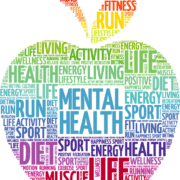PLEASE MASTER is a Dialectical Behavioral Therapy (DBT) skill to help reduce vulnerability to negative emotions. This is a great skill to help with emotional regulation while also having a framework for steps to take that create healthy habits within daily routines.
 Treat PhysicaL Illness
Treat PhysicaL IllnessBalance Eating
Avoid Mood-Altering Drugs
Balance Sleep
Get Exercise
Build MASTERy
Physical Illness:
This area focuses on taking care of your physical health. It is so important to take care of your body. Preventative care not only helps prevent costly future issues but it helps you develop healthy habits to feel good about yourself.
- Shower or bathe regularly; take care of your skin
- Take time to get dressed and put on clean clothes
- Take good care of your oral hygiene and schedule routine dental cleanings
- Establish care with a primary care physician
- Establish care with any specialty providers such as a medical specialist or mental health provider
Balance Eating:
Food definitely affects mood! Many times we eat without thinking about what goes into our bodies. Consider incorporating mindfulness into your eating- increasing awareness at the moment to observe, appreciate, and enjoy your relationship with food. There can be a lot of shame or guilt around eating, especially when there is overeating, binging, purging, or struggles around body image that may contribute to unhealthy eating. Difficulty with access to fresh and healthy food is another common one.
- Establish balanced eating to include plenty of fresh fruits/ vegetables; check out fresh seasonal fruits and vegetables available at your local farmer’s market or co-op
- Limit the use of excessive sugary foods, refined carbs, and foods high in saturated fat and replace these with healthier alternatives
Visit the USDA’s Choose my Plate:
http://www.choosemyplate.gov or Food Pyramid http://www.foodpyramid.com
- Stay hydrated with water
- Be mindful of portion sizes and food choices (especially when eating out)
- Try cooking your own nutritious foods at home or consider healthy meal prep delivery options.
- Consider meeting with a nutritionist or dietitian, or joining a self-help support group
- If you struggle with an eating disorder, please seek help. Here are two excellent resources:
- Food shelves are available to those who may not have reliable access to food. In addition, the Minneapolis public schools are offering free food boxes to youth ages 18 and under. Check out their website for more information.
http://www2.minneapolismn.gov/
Avoid Mood-Altering Drugs:
This includes any non-prescribed drugs, nicotine products, and alcohol. Being aware of patterns of use and emotional state is important. While social and recreational use is common, mood-altering drugs change our mental state. While they can provide temporary relief from emotional distress, they can become addictive, maladaptive ways of coping.
- Seek out resources and supports to help reduce or eliminate the use of mood-altering drugs
- Be honest with your healthcare providers on patterns of use as mixing prescription and mood-altering drugs can have dangerous or deadly consequences
- Reach out to family and friends rather than turning to substances during stressful times
- Be aware of triggers and emotional state during times that lead up to use to help plan ahead for difficult times
- Talk to one of CARE clinicians that works to strengthen the recovery community:
-
Along with CARE team members that passionately work with substance use concerns and people in recovery – Amy Babcock, Jennifer Stoltenberg, Charlotte Johnson, Melissa Pavlik, Katie Immerfall, Bridget Eickhoff, Nate Penz, Heidi Bausch, Charles Hinz, and more!
Balance Sleep:
Sleep is vital to emotional regulation. Establishing good sleep hygiene is a great first step in balancing sleep, starting with a consistent sleep-wake pattern.
- Aim to get your ideal recommended hours of sleep per night (7-8 is a common number for adults)
- Schedule exercise and meal times earlier in the day/ evening
- Create an ideal environment for sleeping -a dark, quiet place that is a comfortable temperature
- Slow down your body and mind before sleeping and avoid screens (e.g. TV, tablets, phones) at least an hour or more before bed)
- Try relaxing and soothing activities to help sleep such as a warm cup of herbal tea, a bath, reading a book, or listening to music
- Talk to your doctor or therapist if you continue to experience sleep difficulties.
Get Exercise:
The benefits of exercise on mental health are amazing! Exercise is a great outlet to help relieve stress and can also help you in other important areas such as taking care of your physical health and promoting good sleep.
- Incorporate physical activity into your daily routine. If you no longer have a morning commute due to working from home, try taking a walk around the block at the beginning and end of your day to get some fresh air
- Don’t underestimate the power of stretching/ stretch breaks, especially for those who work from home!
- Find ways to make exercise fun; take advantage of apps and videos that are available
- Consider joining in physical activity with others such as neighborhood walks
- Utilize tools to track your progress and personal activity goals
We’re Here to help
Our wellness experts will be happy to take care of you. You can CLICK HERE to schedule an appointment now or call (612)223-8898.
Meet Clinicians
We’re united by our commitment to providing effective, relevant, and innovative mental health support at all stages of your journey. Click Here to find out more about who we are, where we come from, and how we live out CARE’s mission every day.
The professionals at CARE are actively collecting and creating resources to help with what you need. We’re Here for You.



 Ruth Bader Ginsburg bu Andrew Spear
Ruth Bader Ginsburg bu Andrew Spear